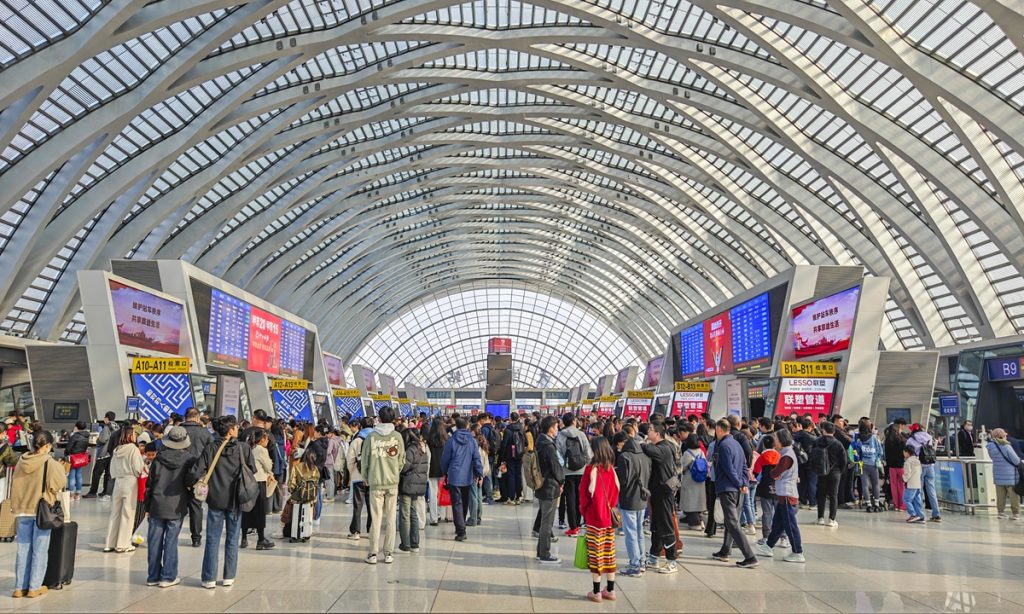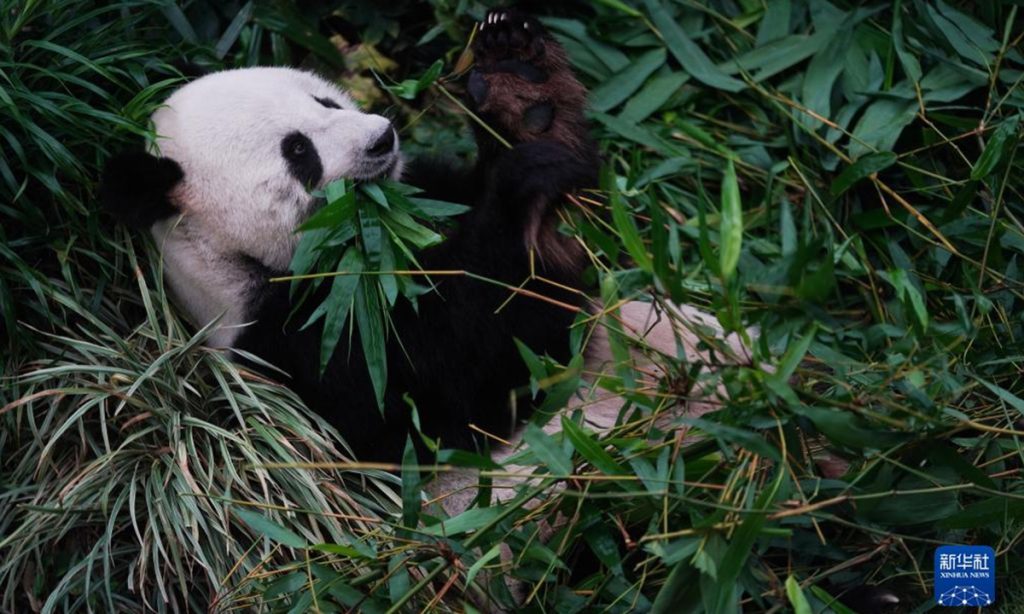Editor's Note:
Xi Jinping, general secretary of the Communist Party of China (CPC) Central Committee, Chinese president, and chairman of the Central Military Commission, stressed that the environment concerns the well-being of people in all countries. During his inspections, Xi has always paid great attention to ecosystems, spanning from cities to rural areas, and from enterprises to communities.
Over the past decade, under the guidance of President Xi Jinping's Thought on Ecological Civilization, China has been advancing the green transition of its economy. Regions across the country are actively promoting the construction of ecological civilization and advancing the Chinese modernization featuring harmony between humanity and nature. These efforts are creating a "Beautiful China."
The coming five years will be critical to the building of a "Beautiful China." The Global Times is launching a series of stories to explore the progress of ecological civilization projects that Xi is concerned with, delving into the positive environmental changes occurring now, and offering valuable insights and references for both national and global efforts. From these portraying, we can see how Xi's thought on ecological civilization is put into practice and further inspire public action.
In the first installment, the Global Times explores Xiamen in East China's Fujian Province, a key birthplace and early adopter of Xi's ecological ideas, to witness the green shift of this international Garden City. The "Xiamen solution" is a crucial component of the vision for building a beautiful China and the "Xiamen practice" has also contributed valuable Chinese wisdom to the global marine governance.
Over the Spring Festival holidays, Xiamen residents' beloved Yundang Lake was transformed into a dazzling display of lights and color, creating a festive atmosphere. Strolling along the lake trail, people were greeted by the harmonious blend of vibrant red lanterns and lush green trees, while the crystal-clear lake water mirrored the graceful movements of elegant egrets.
However, it is hard to imagine that just a few decades ago, Yundang Lake was a starkly different scene.
The once Yundang Port, spanning nearly 10 square kilometers alongside the East China Sea coastline, was drastically reduced to a mere 1.6 square kilometers of enclosed inner lake due to reclamation efforts and dike construction. Rapid urbanization and population growth in the surrounding area exacerbated ecological issues, placing immense environmental strain on Yundang Lake.
As paper mills, tanneries, breweries, and other factories sprang up along its shores, indiscriminately discharging industrial waste and sewage directly into the water, Yundang Lake transformed into a foul-smelling body of water, choked with sewage, littered with garbage, teeming with mosquitoes. People living nearby were left to endure the unbearable stench and suffer the consequences of this form of environmental degradation.
Chinese President Xi Jinping cherishes Xiamen deeply. From his post in the coastal city to leadership roles in Fujian and the central authorities, Xi's ecological protection initiatives on Xiamen have yielded significant results.
As a key birthplace and early adopter of Xi's ecological ideas, Xiamen has pursued systematicecological governance and contributed to high-quality development through marine ecological restoration for over 30 years, fostering harmony between man and nature.
Now, Xiamen has built a beautiful bay living environment, enhancing the ecological vitality of the coastal zone, and contributing the "Xiamen solution" to domestic and international urban marine ecological protection.
A splashing recovery
"It was a momentous occasion for Xiamen people to undergo a consciousness awakening."
Wang Yanyan, chief engineer at the Xiamen Municipal Administration of Parks and Gardens, still vivid remembers how tough the battle against environmental pollution was when it was launched in the city in 1988.
In March 1988, Xi, then serving as executive vice mayor of the city, set in motion a comprehensive strategy to revitalize the lake.
"The vice mayor personally spearheaded the ecological protection of a lake, and with unprecedented efforts, took out 10 percent of the city's annual infrastructure investment for two consecutive years - 10 million yuan - for lake governance," Wang told the Global Times.
Xiamen, as one of the first four special economic zones in China, was also in the critical stage of reform and opening-up in the late 1980s. Despite financial constraints, the city's leaders showed remarkable courage and commitment to the cause.
"The efforts put into the lake's restoration were truly exceptional for the time," Wang emphasized.
Since then, Yundang Lake has witnessed five major restoration projects, with a total investment of nearly 1.99 billion yuan ($270 million).
"Sewage interception is the key to restoring the beauty of Yundang Lake," Xie Xiaoqing, the general manager of Xiamen Municipal Urban Development and Construction Co, Ltd, told the Global Times, noting that over the years, Xiamen has taken bold steps to clean up the lake, shutting down 210 polluting factories, building top-notch sewage treatment facilities, and updating the rainwater and sewage disposal systems in over 800 communities.
"Previously, whenever raindrops fell on the ground in Xiamen, my heart would start to worry, because the rain would make the smell of Yundang Lake even worse. But now, we have improved the water quality in the lake basin from the source, so I can rest easy knowing that the lake is no longer a concern," Xie said.
Zhang Weipeng, the director of the Yundang Lake Protection Center, praised the current innovative use of natural sea tides to flush out lake pollutants as a decision rooted in science and foresight.
Thanks to these measures, Yundang Lake has undergone a remarkable transformation, blossoming into a vibrant hub of finance, tourism, and residential living in Xiamen.
The successful restoration of the lake serves as a shining example for future lake remediation projects in Xiamen, while also inspiring a collective commitment to ecological civilization across the city.
A great example
In January 1986, Xi emphasized at a meeting in Xiamen that "protecting natural scenic resources has far-reaching implications and great significance." But how to balance the relationship between ecological environment protection and development construction?
Xi's position is clear: Can we use partial destruction to achieve development on the other side? I think it is very clear to me that Xiamen cannot exchange development in other aspects at this cost.
In 1994, after gaining legislative power for economic special zones, Xiamen enacted its first substantive local regulation, the "Xiamen Environmental Protection Regulations." Since then, Xiamen has successively enacted more than 10 maritime regulations.
In addition to investing in governance and actively implementing legal safeguards, Xiamen has also implemented a series of institutional innovations, such as establishing the Municipal Government's Marine Management Office, pioneering the formation of a specialized marine cleaning team in China, strictly prohibiting the introduction of heavily polluting projects, and rationalizing the layout of industrial concentration zones.
The ecological protection of bay-type cities is a global issue. Problems such as dense population, industrial agglomeration, high pressure on resources and the environment, environmental pollution, and reduced biodiversity tend to restrict economic and social development.
In 2002, Xi, then deputy Party chief and governor of Fujian, proposed the idea of shifting Xiamen's urban planning from island-based to bay-based.
Since then, the city has undertaken a succession of comprehensive renovation and development projects in five bay areas, aiming to create a "beautiful blue bay" surrounding the city.
A closer look at the city's urban planning reveals the thoughtful "concessions" made to protect the environment: To protect over 500 trees, the Tianyuan Bridge in Wuyuan Bay takes a bend to avoid disturbing the Chinese white dolphins; the plan for the Xiang'an Cross-Sea Bridge was changed to a more costly and labor-intensive underwater tunnel; and Xiamen even built a mountain road with only three lanes to avoid any harms to reservoirs and plants.
Amid the bustling cityscape, Xiamen has set aside a 3-hectare natural reserve for the blue-tailed bee-eater (Merops philippinus), known as the "most beautiful bird in China." This sanctuary provides a safe haven for these majestic creatures to breed and thrive, making Xiamen their northernmost breeding ground in the world.
However, these "concessions" are not compromises. In Xiamen, the sea isn't just a backdrop - it's a way of life. The city's dedication to preserving its natural heritage serves as a shining example for bay cities around the world, showing that with careful planning and a deep respect for nature, economic and social development can coexist harmoniously with the environment.
Guided by Xi's ideas, over the past 36 years, Xiamen has pioneered the concept of comprehensive bay-area governance in domestic coastal regions and invested a total of 105.6 billion yuan in marine ecological protection and restoration, aiming to construct a bay city where humans and nature coexist harmoniously.
The impressive economic development achievements also complement the good ecological environment: In 2023, Xiamen's total economic output exceeded 800 billion yuan for the first time, reaching over 806.6 billion yuan.
The wetland restoration project in Xiamen has set a great example to the world for "making peace with nature," Peter Thomson, the UN Secretary-General's special envoy for the ocean, made the remark at the 2023 World Ocean Week in Xiamen, in November 2023.
Media reports said since 2007, the lessons of treating Yundang Lake have been included in the coastal governance training course of the Chinese government's foreign aid project, and such courses have been provided to more than 100 developing countries and nearly 2,000 officials and technical personnel around the world.
A rooted initiative
During the winter months, Xiamen becomes a haven for flocks of cormorants seeking shelter and sustenance in the tranquil waters of Xinglin Bay. The sight of these majestic birds soaring through the sky in unison is a breathtaking spectacle.
"Whether the ecology is good or not, the birds know best," said Guo Qiang, a member of the Xiamen Bird Watching Association, who eagerly captures the beauty of these overwintering birds with his camera.
With years of experience behind the lens, Guo said he felt lucky to see firsthand the positive impact of Xiamen's efforts to restore its marine ecosystem.
There are countless dedicated bird enthusiasts like Guo in Xiamen on hand to document the birds' behaviors and movements, serving as guardians of the city's precious ecological treasures.
The essence of Xi's thought on ecological civilization has truly taken root in the hearts of Xiamen residents, becoming a natural and heartfelt commitment for all,Zhang said, noting that currently in Xiamen, the focus on ecological protection has transformed from government-leading to active public action.
Zhang shared a heartwarming story about a recent incident at Yundang Lake. "During the cold wave a week ago, many people called to ask the conservation center to pay attention to the warm work of the birds. We immediately sent experts to the field and made emergency plans to respond to people's concerns," he said.
Zhang's WeChat account is a hub of activity, with groups dedicated to cleaning the lake, testing water quality, and managing the "Xiamen Yundang Blue Volunteer Service Team."
One inspiring member of this team is Chen Yajin, donning a blue vest after retiring at 65 to become the "citizen lake chief." He spends his days patrolling the lake, gathering feedback from the public.
On the picturesque ecological artificial island of Maluan Bay in Xiamen, the Global Times observed citizens actively participating in the "tree adoption activity." They rolled up their sleeves, bent down, and lovingly tended to the trees they had adopted, carefully placing nameplates, watering, and nurturing the once barren land that had been transformed by the hard work of local villagers.
One young mother, Zheng, shared her thoughts with Global Times as she participated in the activity with her children. "We bring our children here to plant trees, to show them that the beauty surrounding them is not easy to come by. President Xi brings ecological wealth and green well-being to Xiamen, which is extremely precious for us," she said. "We want to instill in them a sense of responsibility as caretakers of the environment."
"Most children now all know that the plants and animals in the sea and mountains of Xiamen are their good friends. With the companionship of these well-cared-for friends, they will grow up healthier and stronger," Zheng said.








